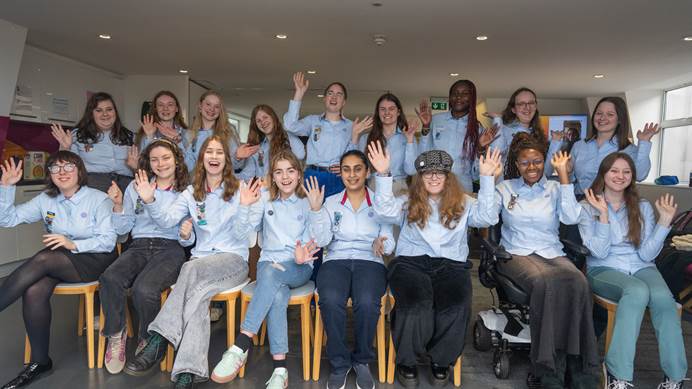Putting a spotlight on peer education training
Learn all about becoming a peer educator
You might have heard about peer educators, but have you heard what it’s like to become one?
Here, two of our peer educators give you a sneak peak at what it’s like to train to become a peer educator.
Before training begins
Ahead of the courses, you have a few bits to do, the Introduction to peer education e-learning and the A Safe Space training that’s right for your age.
You’ll also want to watch the topic videos for whichever session you’re going to be delivering.
Day one: the skills day
This day teaches you about the bread and butter of being a peer educator, giving you all the skills you’ll need to run successful sessions.
‘Day one of our peer education training was great fun! We learnt news skills on how to communicate peer-to-peer to different aged groups, Brownies, Guides and Rangers, how to deal with safeguarding and safety, how to manage challenging behaviour and how to organise, facilitate and then reflect on a session. Alongside learning loads of new games and icebreakers to help us get to know the group,’ says peer educator Clare.
‘For me the most interesting part was learning about peer-to-peer communication,’ Clare adds. ‘Being a Guide and Brownie leader, it was helpful to learn how to come out of the leader role and become a peer to the group. Also working on challenging difficult behaviours, particularly comments, as before the session I would’ve found this hard to approach but I have now got the knowledge as to know when to speak out and challenge the perspective of the peer.
‘Over the day I gained new friends and the confidence to speak to a larger audience, something I struggled with before the weekend. It was such great fun and everyone should think about becoming a peer educator for the knowledge on new topics and the life skills you gain!’
Day two: the topic day
This day is where you find out about the topic you’re going to deliver. Often you’ll be joined by experienced peer educators, so it’s a great chance to learn from people who have already been there and done it.
‘We finally got what we had all been waiting for: The Book. After they handed them out, we eagerly flipped through the pages of different activities and helpful tips, and the day began. It was time to put what we had learnt in day one into practice,’ explains peer educator Alura-Rose.
‘We started in groups. I was in a group of about six people, all of us in pairs, and each pair had to lead a different activity,’ adds Alura-Rose. ‘Me and my partner led a great game where one person was blind-folded, their partner was the director, and the rest of the group had to make obstacles with scarfs. We explained (quite nervously, but that was why we did it in smaller groups first) how the game was to play out, and everyone’s role within it.
‘We made sure the activity ran smoothly, and afterwards discussed with the group what went well and what we could have improved upon. Listening to what they said about our leadership was really helpful in understanding what was most effective, and even giving out feedback to other pairs enabled us to realise what we were looking out for.’
Throughout the day, the training peer educators keep practising the topic and delivery, making sure that they are inclusive and confident.
Alura-Rose says: ‘Regrouping with the other groups, we once again were put into pairs. This time, each pair had to organise and activity for the rest of the group, but it was up to them to adapt it.
‘For example, this would mean changing the wording to fit the age group or improvising a little when things didn’t go quite to plan. Although I was a little anxious at first, me and my partner quickly found our feet, and with the support of everyone else it all went well.’
After the training
You’ll keep on being supported, even once training is over. Girlguiding’s peer education coordinators are there to help you grow your skills and find units to lead sessions with. You’ll have a personal development plan you can work on, making sure you’re always improving your skills.
And once you start leading sessions, the most exciting part of it all, you’ll get to see the huge difference peer educators make.
Find out more about peer education and, if you’re aged 14-25, find out how to become a peer educator.



